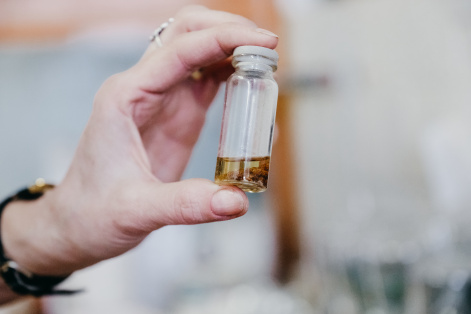Climate change affects the formation of spores and pollen in Siberian spruce
24 February 2021 г.

Siberian spruce is widespread in Russia from the border of the forest-tundra in the north to the steppe zone in the south. Due to climate change, the habitat of this tree species may change. It is important for scientists to understand how trees will adapt to changing environment, in particular, how they will reproduce in other conditions.
Researchers at the Krasnoyarsk Science Center SB RAS, together with their Moscow colleagues, found that in Siberian spruce growing within Krasnoyarsk, warming results in a change in some stages of meiosis, which is the process of cell division and formation of male reproductive organs. These spruce trees also had much more mutations due to genetic transformations. All this indicates a high adaptive capacity of the species to climate change.
For research, biologists collected spruce shoots with microstrobilus (organ in which spores and pollen are formed. Scientists found out that the nuclei of germ cells do not divide simultaneously not only in different trees, but also within the same microsporangium. The researchers note that such a strong asynchrony was not previously observed in natural spruce populations of Siberia, nor was it found in the extreme conditions of the Far North. In addition, in urban spruce trees, the nuclei were observed to divide at much lower daily temperatures, and reproduction lasted longer than in natural populations of spruces. Pollen grains were generally smaller than usual, and also had an abnormal number of air sacs. Scientists suggest that this should be due to the response of the three species to changes in environmental conditions, in particular, to an increase in soil and air temperature.
“Plants are especially sensitive to changes at the seedling stage and that of reproductive organ formation, when the spore formation processes adapt to the new temperature regime and daylight duration. We studied the growth of Siberian spruce when their growing conditions changed. As a result, we revealed the response of the species to a rapid change of climatic regimes. The analysis of meiosis in Siberian spruce showed a fast cell division, significant asynchrony of the cell development, and a rather narrow spectrum of anomalies. This may indicate a high viability of pollen.
The results show that Siberian spruce quickly adapts to climatic changes, at least, to temperature. We assume that this species has a high adaptive potential, and it will spread well, to occupy large areas under climate changes, ” says Elena Bazhina, Candidate of Biological Sciences, senior researcher at the V.N. Sukachev Institute of Forest SB RAS.
The researcher notes that in the future, scientists will consider how female reproductive organs respond to unusual external conditions and how fertilization and seed development proceed under these conditions. This will make it possible to determine how climate change will affect the reproduction process of Siberian spruce and its distribution.
This work was supported by the Russian Foundation for Basic Research (No. 20-05-00540).
Share:
